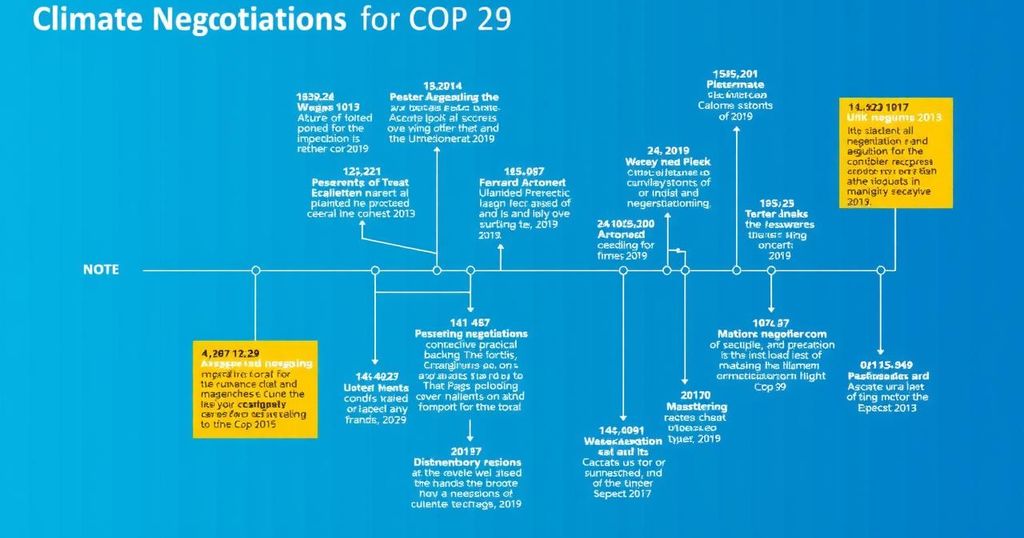Climate change
AL GORE, ASIA, AZERBAIJAN, BERLIN, CHARLES DAVID KEELING, CLIMATE CHANGE, ENVIRONMENTAL POLICY, EUROPE, GEORGE W. BUSH, GERMANY, GLOBAL WARMING, GORE, GREENHOUSE GAS EMISSIONS, GUY CALLENDAR, HAWAII, INTERNATIONAL COOPERATION, KEELING, MARGARET THATCHER, NORTH AMERICA, PARIS AGREEMENT, REUTERS, SENATE, SV, SVANTE ARRHENIUS, SWEDEN, U. N, U. N. CLIMATE SCIENCE AUTHORITY, UN, UNITED STATES
Isaac Bennett
0 Comments
A Historical Overview of UN Climate Negotiations Leading to COP29
The UN climate negotiations, starting in 1995, have witnessed significant developments to address global warming. Key agreements, including the UNFCCC, the Kyoto Protocol, and the Paris Agreement, underscore the importance of international cooperation. Recent COP meetings have focused on funding mechanisms and a transition away from fossil fuels. The evolution of these talks reflects both the challenges and commitments made by nations to combat climate change effectively.
The United Nations climate negotiations have critically evolved since their inception in the 1990s to combat global warming. The inaugural Conference of the Parties (COP) took place in 1995, founding a series of pivotal discussions focused on addressing the growing threat of climate change. Initial breakthroughs, such as the establishment of the UN Framework Convention on Climate Change (UNFCCC) in 1992 and the Kyoto Protocol in 1997, set foundational frameworks for emissions targets among nations. Over the years, significant moments included the Paris Agreement in 2015, which marked a transformative commitment from all countries to tackle climate change collectively, aiming to limit global warming to well below 2 degrees Celsius. More recent conferences, such as COP27 in 2022 and COP28 in 2023, directed focus towards urgent financial mechanisms and strategies to reduce reliance on fossil fuels and manage catastrophic climate impacts.
The necessity for international cooperation in addressing climate change has been a pressing issue since the late 20th century. Rising levels of carbon dioxide and the correlated increase in global temperatures necessitated scientific and political responses. The UN climate negotiations represent a crucial effort to bring together nations to agree upon policies, targets, and mechanisms that can effectively reduce greenhouse gas emissions and mobilize resources for climate adaptation. Historical milestones in these negotiations underscore the challenges and progress made in achieving a unified global approach.
In summary, the history of UN climate negotiations reflects an ongoing struggle against the backdrop of escalating climate emergencies and evolving international relations. The series of COP meetings have highlighted both achievements and setbacks in the quest for effective climate governance. As the negotiations continue to adapt to the realities of climate change, the urgency for cooperative action is more critical than ever, particularly as evidenced by recent commitments to transition from fossil fuels.
Original Source: www.swissinfo.ch




Post Comment